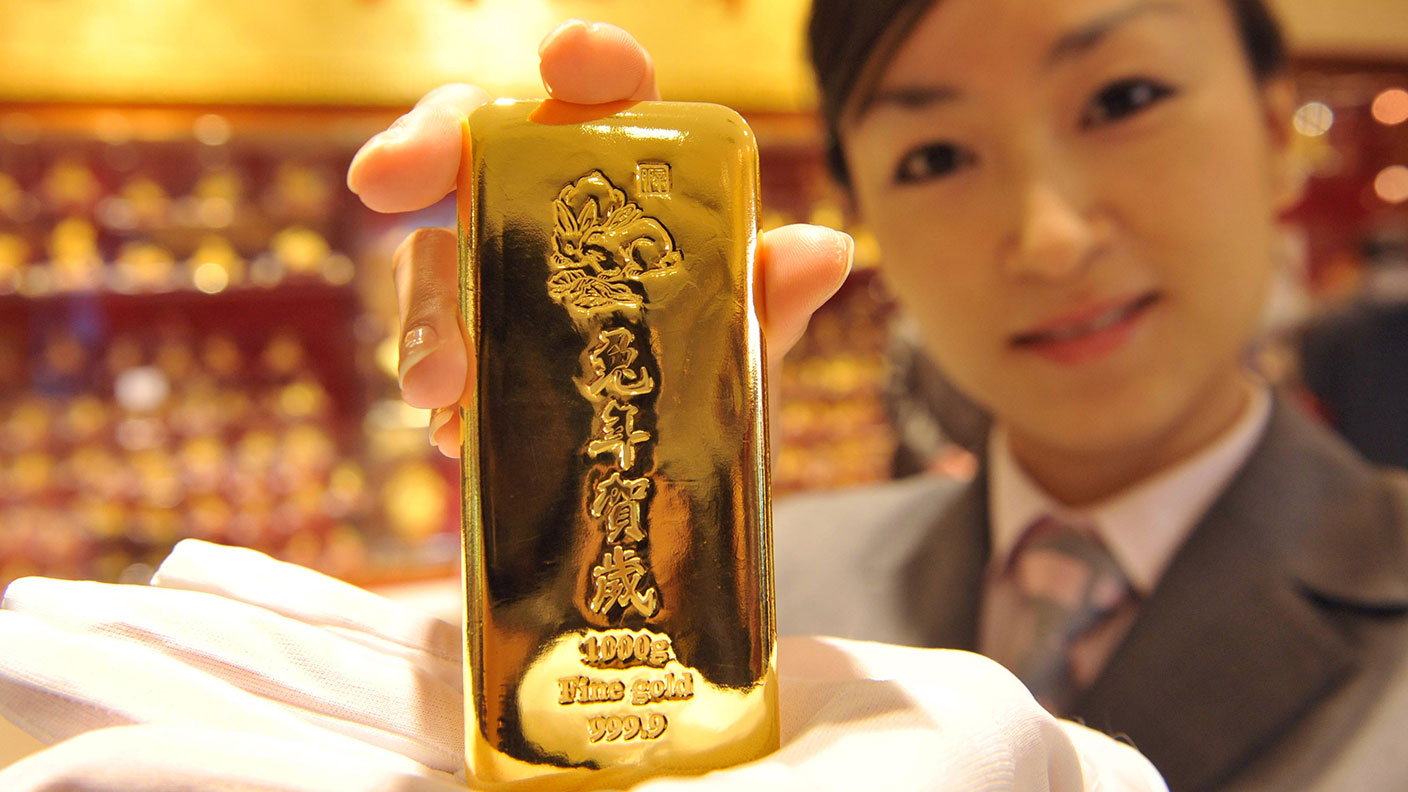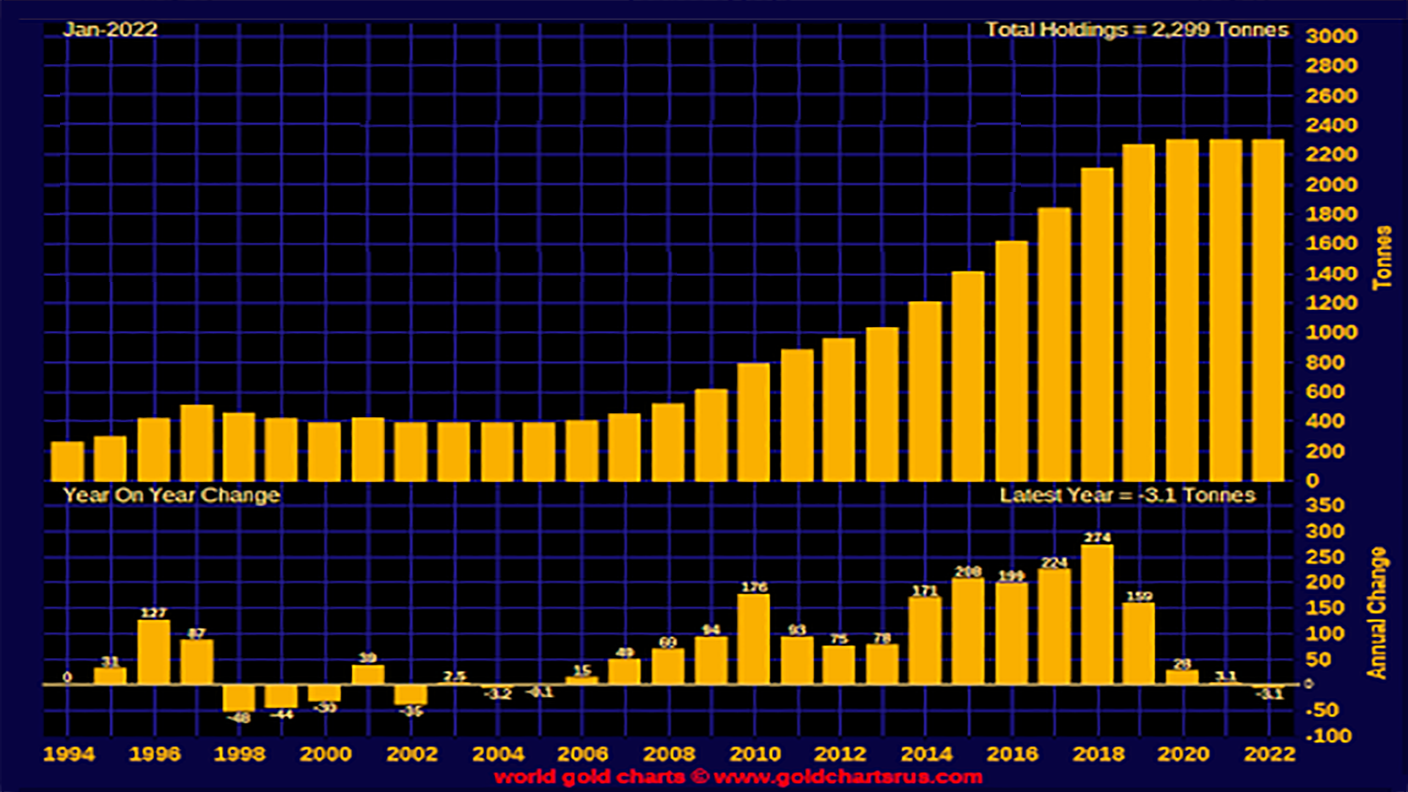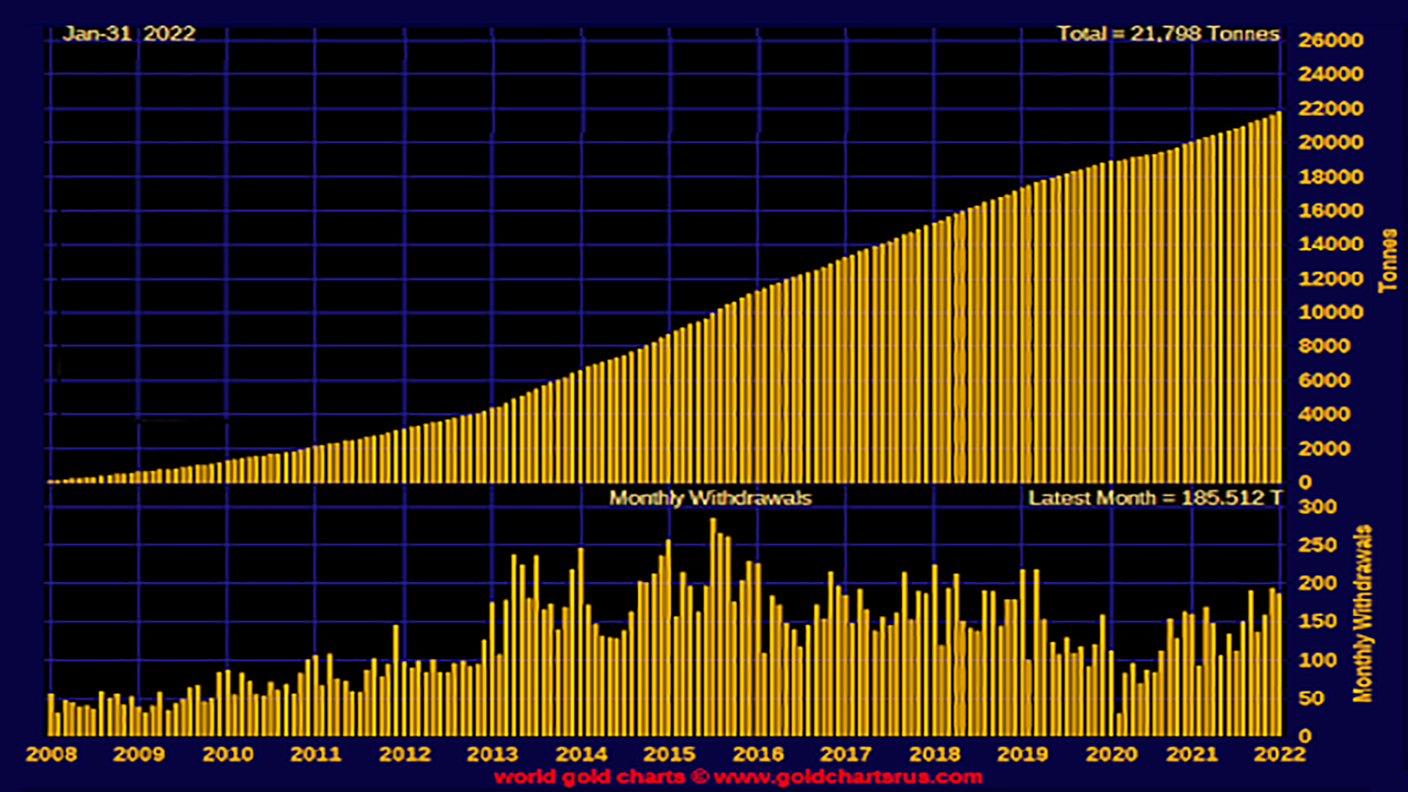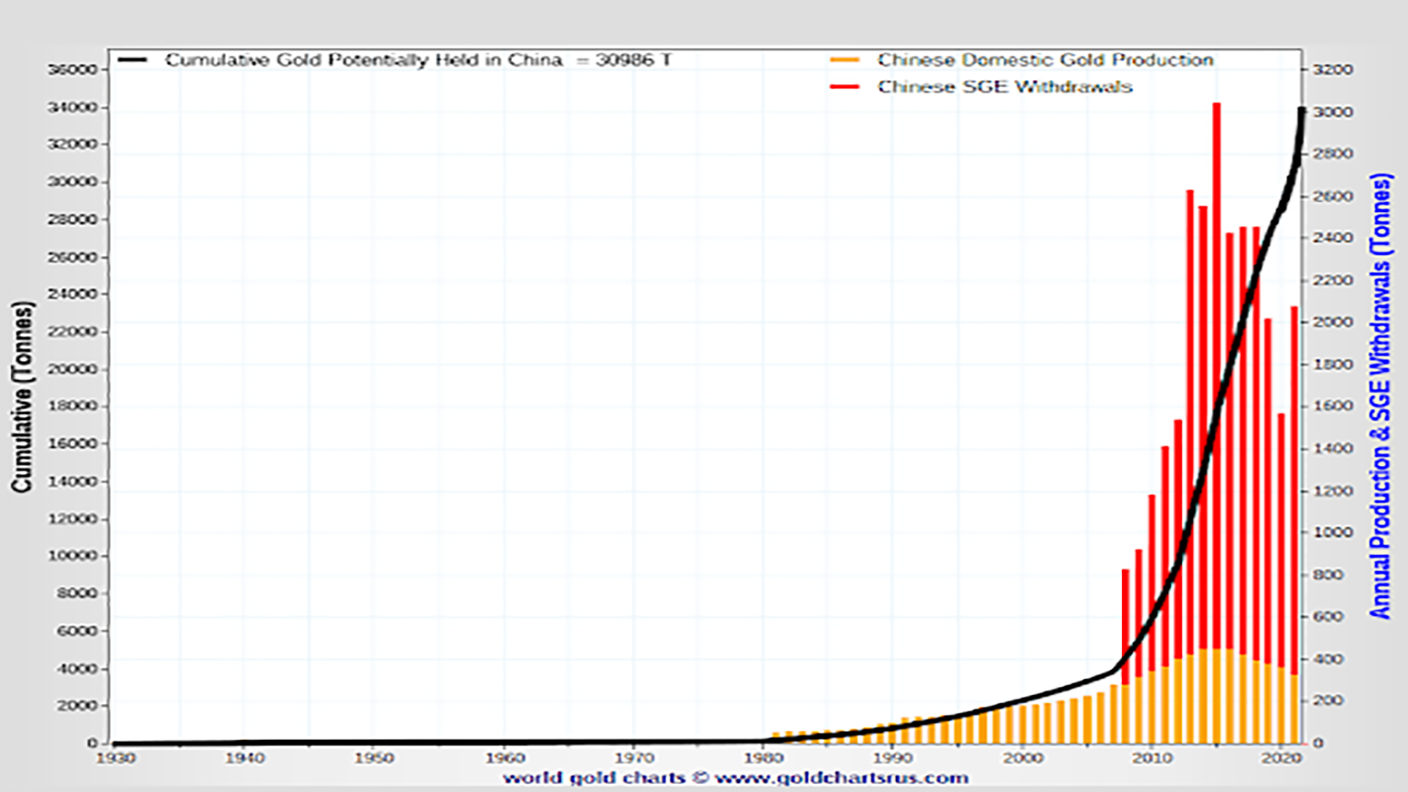China almost certainly owns more gold than the US – here’s why that matters
China almost certainly owns a lot more gold than anyone else – including the USA. But how much? And why does it need so much gold? Dominic Frisby explains.


Get the latest financial news, insights and expert analysis from our award-winning MoneyWeek team, to help you understand what really matters when it comes to your finances.
You are now subscribed
Your newsletter sign-up was successful
Want to add more newsletters?

Twice daily
MoneyWeek
Get the latest financial news, insights and expert analysis from our award-winning MoneyWeek team, to help you understand what really matters when it comes to your finances.

Four times a week
Look After My Bills
Sign up to our free money-saving newsletter, filled with the latest news and expert advice to help you find the best tips and deals for managing your bills. Start saving today!
If you thought the West was unprepared for inflation – or indeed for Russia – wait and see just how unprepared it is for this bombshell.
This is the biggest story in world finance, and yet nobody, bar your intrepid blogger, is reporting on it.
For those without the attention spans to read all the way to the end, let’s cut to the chase and get the main point out upfront: China has more gold than the United States.
MoneyWeek
Subscribe to MoneyWeek today and get your first six magazine issues absolutely FREE

Sign up to Money Morning
Don't miss the latest investment and personal finances news, market analysis, plus money-saving tips with our free twice-daily newsletter
Don't miss the latest investment and personal finances news, market analysis, plus money-saving tips with our free twice-daily newsletter
Why China might want to own a lot more gold than it’s admitting
We’ve seen many examples over the last few decades of how the United States weaponises the dollar, exploiting its status as global reserve currency.
The sanctions on Russia and its removal from the Swift messaging system this week are perhaps the most dramatic example of all. Russian civilians have had their wealth decimated (in fact, probably significantly more than decimated for most) almost overnight.
China will be surely watching all of this, learning from Russia’s mistakes and thinking it needs to de-dollarise as swiftly and discreetly as possible. Whether to protect its citizens’ wealth or its national interests, China cannot be beholden to a banking system that is run by the West – the US especially – and which is one of their weapons of war.
Both Russia and China have known they must de-dollarise for some considerable time, which is why both have been so steadily increasing their gold holdings.
Let’s start with Russia’s gold. The chart is courtesy of Nick Laird of goldchartsrus.com and it shows the Russian Central Bank’s accumulation to today’s figure of, give or take, 2,300 tonnes – roughly 74 million ounces (there are 32,150 troy ounces in a tonne).

That makes Russia, according to official figures at least, the fifth-largest gold owner in the world.
The table below, courtesy of the World Gold Council, shows the top 19 owners of gold, also their foreign exchange reserves and their percentage allocation to gold. The US has the most – 8,134 tonnes – followed by Germany, Italy, France and Russia.
The UK sits proudly in 17th position. Behind Kazakhstan, Turkey and Uzbekistan. Thank you Gordon Brown.
| Row 0 - Cell 0 | Country | FX reserves $m | Total reserves $m | Gold holdings % | Gold reserves Oz (m) | Gold reserves (tonnes) |
| 1 | USA | 239,485 | 695,225 | 65.55 | 455,741 | 8,133.5 |
| 2 | Germany | 99,513 | 287,732 | 65.41 | 188,219 | 3,359.1 |
| 3 | Italy | 83,583 | 220,966 | 62.17 | 137,383 | 2,451.8 |
| 4 | France | 102,439 | 238,954 | 57.13 | 136,515 | 2,436.4 |
| 5 | Russian | 485,462 | 614,255 | 20.97 | 128,793 | 2,298.5 |
| 6 | China | 3,264,064 | 3,373,233 | 3.24 | 109,169 | 1,948.3 |
| 7 | Switzerland | 1,019,165 | 1,077,439 | 5.41 | 58,274 | 1,040.0 |
| 8 | Japan | 1,358,141 | 1,405,543 | 3.37 | 47,402 | 845.9 |
| 9 | India | 598,057 | 639,736 | 6.52 | 41,679 | 743.8 |
| 10 | Netherlands | 28,229 | 62,547 | 54.87 | 34,318 | 612.4 |
| 11 | Taiwan | 544,899 | 568,636 | 4.17 | 23,7367 | 423.6 |
| 12 | Kazakhstan | 13,407 | 35,664 | 62.41 | 22,257 | 397.2 |
| 13 | Turkey | 81,176 | 103,186 | 21.33 | 22,010 | 392.8 |
| 14 | Uzbekistan | 13,070 | 34,558 | 62.18 | 21,489 | 383.5 |
| 15 | Portugal | 11,606 | 33,042 | 64.88 | 21,436 | 382.6 |
| 16 | Saudi Arabia | 465,059 | 483,161 | 3.75 | 18,102 | 323.07 |
| 17 | UK | 175,879 | 193,265 | 9 | 17,386 | 310.3 |
| 18 | Lebanon | 19,430 | 35,501 | 45.27 | 16,072 | 286.8 |
| 19 | Spain | 75,479 | 91,256 | 17.29 | 15,778 | 281.6 |
The country we are focusing on today is the one in sixth place on that table, China.
Here’s why China’s gold reserves must be far bigger than official data suggests
First, consider China’s US dollar holdings – over three trillion of them. That’s more than the UK’s annual GDP. Its US dollar holdings eclipse those of every other nation; China is not going to want those to go to zero – not yet, anyway.
Then consider its gold holdings. It has 1,948 tonnes, barely 3% of its foreign exchange reserves. The US’s gold holdings equate to over 65% of its reserves.
What if China were to approach that level?
Well, my argument is that China has much more gold than it says it does.
There are two parts to this argument. First, China’s gold mining. In 2007, China overtook South Africa as the world’s largest gold producer. It has remained so ever since. This past decade it has produced about 15% of all the gold mined in the world.
Since 2000, China has mined roughly 6,830 tonnes. Over half of Chinese gold production is state-owned – the China National Gold Group Corporation alone accounts for 20%. And China keeps the gold it mines – the export of domestic mine production is not allowed.
I say that number again: 6,830 tonnes. Already that official 1,948 figure looks very dubious.
With reserves in decline at home, Chinese mining companies have also been buying assets abroad, across Africa, South America and Asia. International production exceeds domestic production – by about 15 tonnes in 2020.
Second, there is the fact that, as well as being the biggest producer, China is the world’s biggest importer. Gold imports via Switzerland and Dubai are not always declared, but we do know that via Hong Kong alone, over 6,700 tonnes have entered the country since 2000.
Add that to cumulative gold production since 2000, and you get a figure over 13,500 tonnes.
Whether imported, mined or recycled, most of the gold that enters China goes through the Shanghai Gold Exchange (SGE), including the gold imported from Hong Kong. So SGE withdrawals – for which we do have numbers – can act as something of an approximation for demand. And it is possible to get numbers for SGE withdrawals: since 2008, almost 22,000 tonnes have been withdrawn from the SGE.

Then we have to add gold held in China, whether as bullion or jewellery, before 2000. The World Gold Council estimates a figure of 2,500 tonnes in privately-held jewellery. Added to domestic mining and official reserves, you get a figure of around 4,000 tonnes.
Cobble it all together – cumulative production, imports and existing stock – and you arrive at a figure not far off 31,000 tonnes.

I’ve spoken to some of the world’s top analysts – Ross Norman, Bron Suchecki and Koos Jansen – and they all arrive at similar estimates. Alasdair McLeod of Goldmoney thinks it is higher still.
So why would China keep its gold reserves quiet?
But there is more, as Ross Norman points out.
Not all gold entering China is accounted for by SGE withdrawals. The People's Bank of China (PBOC), the central bank, likes to buy 12.5kg bars, which do not trade on the SGE. The PBOC often uses dollars on exchanges in London, Dubai and Switzerland, while the SGE sells its gold in yuan.
The Chinese army, too, owns gold and does not have to declare its purchases. And there are other state agencies, as well: the State Administration of Foreign Exchange and China Investment Corporation – the sovereign wealth fund, for example.
How much of this gold is state owned? Norman guesses 50%; Suchecki, formerly of the Perth Mint, says 55%.
At 50%, the implication is that China owns over 15,000 tonnes – closing in on double the US.
“Chinese Central Bank gold holdings have apparently been entirely unchanged since mid-2019 at 1,948 tonnes,” Ross Norman tells me. “But few of us believe that. Put an additional zero on the end (19,480 tonnes) and I should not be surprised if that is not much closer to their official holdings”.
Alasdair McLeod goes one stage further. “The PRC probably has as much as 30,000 tonnes hidden in various accounts, but not declared as official reserves”.
Whether ten, 15 or 30,000 tonnes, there is no way China can declare such large holdings. Not yet anyway – it would cause an unwanted surge in both the yuan and the gold price. The government's $3.2trn of US dollar foreign exchange reserves would be devalued.
“I don’t think China needs to brag about its largesse,” says Norman. “After all, a stronger currency as a result of that reserve backing would be counter-productive, as it would confer competitive disadvantage”.
What’s more, to declare so much gold would be a direct challenge to American supremacy, which China is probably not yet ready for. Parity first, then supremacy.
For now they follow Deng Xiaoping's doctrine of “we must not shine too brightly.” Its declared 1,948 tonnes is, perhaps, the bare minimum it could declare and look credible. But a mere 3% of China’s forex reserves in gold? Pull the other one.
If China decides to weaponise money, as the US has done, all it has to do is declare its gold holdings, perhaps even partially back the yuan with them. Talk was, at one stage, its central bank digital currency (CBDC) would be partially gold backed.
Unbacked Western money risks losing a great deal of its purchasing power in such an event. To back Western fiat even partially with gold would mean a dramatic upwards revaluation of gold – into the tens of thousands.
But that is the card China now has with its 20 years of relentless accumulation. He who owns the gold, makes the rules.
Dominic’s film, Adam Smith: Father of the Fringe, about the unlikely influence of the father of economics on the greatest arts festival in the world is now available to watch on YouTube.
Get the latest financial news, insights and expert analysis from our award-winning MoneyWeek team, to help you understand what really matters when it comes to your finances.

-
 Should you buy an active ETF?
Should you buy an active ETF?ETFs are often mischaracterised as passive products, but they can be a convenient way to add active management to your portfolio
-
 Power up your pension before 5 April – easy ways to save before the tax year end
Power up your pension before 5 April – easy ways to save before the tax year endWith the end of the tax year looming, pension savers currently have a window to review and maximise what’s going into their retirement funds – we look at how
-
 Halifax: House price slump continues as prices slide for the sixth consecutive month
Halifax: House price slump continues as prices slide for the sixth consecutive monthUK house prices fell again in September as buyers returned, but the slowdown was not as fast as anticipated, latest Halifax data shows. Where are house prices falling the most?
-
 Rents hit a record high - but is the opportunity for buy-to-let investors still strong?
Rents hit a record high - but is the opportunity for buy-to-let investors still strong?UK rent prices have hit a record high with the average hitting over £1,200 a month says Rightmove. Are there still opportunities in buy-to-let?
-
 Pension savers turn to gold investments
Pension savers turn to gold investmentsInvestors are racing to buy gold to protect their pensions from a stock market correction and high inflation, experts say
-
 Where to find the best returns from student accommodation
Where to find the best returns from student accommodationStudent accommodation can be a lucrative investment if you know where to look.
-
 The world’s best bargain stocks
The world’s best bargain stocksSearching for bargain stocks with Alec Cutler of the Orbis Global Balanced Fund, who tells Andrew Van Sickle which sectors are being overlooked.
-
 Revealed: the cheapest cities to own a home in Britain
Revealed: the cheapest cities to own a home in BritainNew research reveals the cheapest cities to own a home, taking account of mortgage payments, utility bills and council tax
-
 UK recession: How to protect your portfolio
UK recession: How to protect your portfolioAs the UK recession is confirmed, we look at ways to protect your wealth.
-
 Buy-to-let returns fall 59% amid higher mortgage rates
Buy-to-let returns fall 59% amid higher mortgage ratesBuy-to-let returns are slumping as the cost of borrowing spirals.